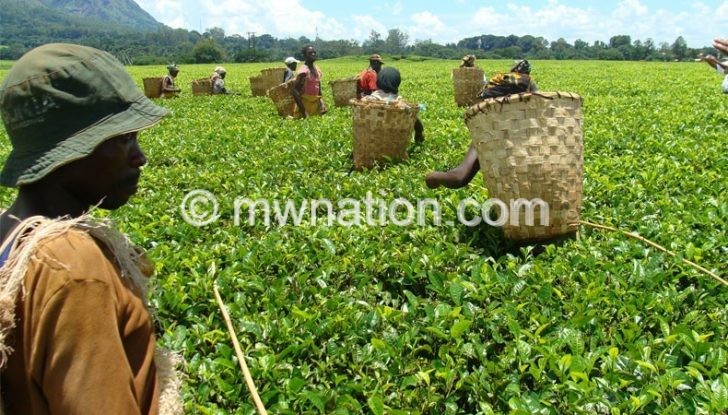Merchants for openness in tea sector
Low prices continue to haunt Malawian tea on the auction floors, a bitter irony for producers as the country is regarded as the pioneer of tea-growing in Africa.
The sector is also veiled in secrecy; something the Malawi Tea and Coffee Merchants Association (MTCMA) wants to change.

The organisation on Tuesday said it wants strong monitoring policies in the sector, including an open and transparent tea auction system.
The tea body wants new measures put in place to ensure there is ‘greater transparency’ in the production and marketing of tea, one of Malawi’s largest forex earners.
For a start, MTCMA wants media presence at all tea auctions, according to its new chairperson, William Sichinga.
“The nation must know how many estates bring their tea to the local market, the amount of tea sold at each auction and at what price. This will remove all the mistrusts that are there,” he adds.
Commercial tea production in Malawi started way back in the 1880s during the British colonial era. Large tea estates have since then been a key feature of the tea sector.
MTCMA says the first tea was planted in Malawi in 1878. The crop is now mainly grown in the southern districts of Thyolo and Mulanje.
However, the country has little to show for its rich tea history.
Thyolo Boma, where most tea is grown and tea factories call home, is a dusty old town. Important tea structures; the tea auction house, tea warehouses, tea brokers and tea blenders are all located in Blantyre. Thyolo Boma, the home to President Peter Mutharika is slowly dying under his watch and there is no hope in the short-term, since tea output has been falling fthe past five years.
Yet Malawi used to be contributing three percent of global tea exports, according to data from the Tea Association of Malawi (TAML), an association of major tea growers in the country.
Sichinga who recently took over MTCMA leadership from Ross Mac Donald, faults the system.
“Business in the tea sector has been allowed to thrive in secrecy for many years with government deliberately looking the other way, while a few individuals dominated the sector.
“It is time we allow the media to attend the weekly tea auctions and provide them data on time so that the public is well informed about the market and prices of the commodity. This will enable the media to compare local prices and that from our rival market in Mombasa [in Kenya],” said Sichinga in an interview with Weekend Business on Tuesday.
“Tea merchants who are mostly buyers have been ignored in policy-making process for a longtime. But we want to be involved and ensure that not only a single group in the chain is calling the shots,” he adds.
The crop is the country’s second biggest foreign exchange earner, contributing 7.9 percent of total export earnings, says the Malawi Confederation of Chambers of Commerce and Industry (MCCCI). Tobacco remains the main foreign exchange earner.
Malawi ranks second after Kenya as the largest producer and exporter of tea in Africa. It is twelfth on the global list of tea producing countries.
But despite the country’s prominence in the cultivation of this crop, of late Malawian tea producers have been complaining that the price for Malawian tea is low when compared to its neighbour, Kenya.
Some producers have resorted to direct contracts with international buyers who not registered in Malawi and are not members of the MTCMA.
“That’s the whole reason we want transparency. Those buyers who are buying tea in the country to become members of our grouping. I think its important that all tea is sold on the auction system,” he explained.
According to industry sources, last year more than 9 million kgs of tea was sold on direct contract, while 32 million kgs was sold on auction.
The source said the danger of allowing tea producers to sell directly to buyers is that the trend is prone to under declaring of proceeds and abuse.
In an earlier interview, chairperson of the Taml Sangwani Hara said all these problems are being looked into through several reforms the sector has started implementing.
“There is a taskforce which is implementing the reforms in the sector under the Malawi Tea Revitilisation Programme 2020,” he said.
An industry, however, expert says the taskforce has a daunting task to bring in necessary changes in the sector.
“Government has had very little control over the sector. Unlike in Kenya, where the tea board is in control of the sector, Malawi has no such regulatory body and for many years, it allowed producers, brokers and buyers to run their own show, including managing the auction system,” the expert said. n





